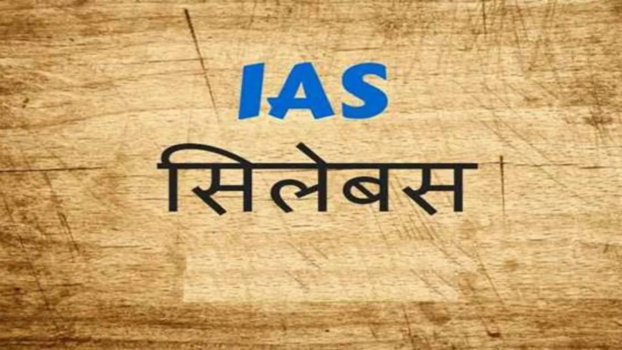The UPSC Syllabus for IAS is a vast and challenging one, demanding rigorous preparation and dedication from aspirants. Cracking the Civil Services Examination requires a deep understanding of the syllabus, a strategic approach to study, and consistent effort. This article provides a comprehensive overview of the UPSC Syllabus for IAS, outlining the key subjects, their intricacies, and essential tips for effective preparation.
Preliminary Examination (Civil Services Preliminary Examination)
The Preliminary Examination is the first hurdle in the UPSC Civil Services Examination. It consists of two objective-type papers:
- Paper I: General Studies
- Current events of national and international importance: This section covers a wide range of topics, including political, economic, social, and scientific developments.
- History of India and Indian National Movement: Focus on major events, personalities, and movements that shaped India’s past.
- Indian and World Geography – Physical, Social, Economic Geography of India and the World: Understand key geographical features, resources, and their impact on human societies.
- Indian Polity and Governance – Constitution, Political System, Panchayati Raj, Public Policy, Rights Issues: Gain a thorough understanding of the Indian Constitution, its provisions, and the functioning of the Indian political system.
- Economic and Social Development – Sustainable Development, Poverty, Inclusion, Demographics, Social Sector Initiatives: Analyze economic and social issues facing India, such as poverty, inequality, and social sector development.
- Environmental Ecology, Biodiversity, and Climate Change – Environmental Pollution and Degradation, Conservation, Environmental Impact Assessment: Explore environmental challenges and their impact on human life and the planet.
- Science and Technology – Developments and their applications and implications: Keep abreast of advancements in science and technology, their applications, and their impact on society.
- Paper II: Civil Services Aptitude Test (CSAT)
- Comprehension: Analyze and interpret given passages effectively.
- Data Interpretation: Analyze and interpret data presented in various formats (tables, graphs, charts).
- Decision-Making and Problem-Solving: Develop critical thinking and problem-solving skills to address real-world scenarios.
- Logical Reasoning and Analytical Ability: Enhance your logical reasoning and analytical skills to solve complex problems.
- Basic Numeracy: Develop basic numerical skills for data interpretation and problem-solving.
Main Examination (Civil Services Main Examination)
The Main Examination is a more rigorous stage, consisting of nine papers:
- Paper A: Indian Language
- Paper B: English Language
- Essay
- General Studies – Paper I
- Indian Heritage and Culture – History, Art and Culture of India
- History of the World – World History
- Geography of the World and India
- Society
- World History
- General Studies – Paper II
- Governance, Constitution, Polity, Social Justice and International relations
- Bilateral, regional and global groupings and agreements involving India and/or affecting India’s interests
- Effect of policies and politics of developed and developing countries on India’s interests
- Important International institutions, agencies and fora – their structure, mandate
- General Studies – Paper III
- Economic development
- Agriculture
- Science and Technology
- Environment, Ecology, Biodiversity and Climate Change
- Disaster and Disaster Management
- Internal Security
- General Studies – Paper IV
- Ethics, Integrity and Aptitude
- Emotional intelligence – concepts, and their utilities and application in administration and governance
- Contributions of moral thinkers and philosophers from India and world
- Public/Civil service values and Ethics in Public administration
- Probity in Governance
- Case Studies on above issues
- Optional Subject – Paper I
- Optional Subject – Paper II
Optional Subjects
Candidates have the option to choose one of the following subjects for the Main Examination:
- Ancient History
- Medieval History
- Modern History
- World History
- Geography
- Sociology
- Political Science and International Relations
- Public Administration
- Economics
- Agriculture
- Animal Husbandry and Veterinary Science
- Forestry
- Botany
- Zoology
- Chemistry
- Physics
- Mathematics
- Statistics
- Philosophy
- Psychology
- Law
- Literature of any of the languages included in the Eighth Schedule to the Constitution
Personality Test (Interview)
The final stage of the UPSC Civil Services Examination is the Personality Test, which is an interview conducted by a Board. This test assesses the candidate’s personality, suitability for administrative service, and overall mental and intellectual ability.
Key Considerations for UPSC Syllabus Preparation
- Understand the Syllabus In-Depth: A thorough understanding of the UPSC Syllabus for IAS is crucial. Go through each subject meticulously, identifying key concepts, topics, and areas that require focused attention.
- Develop a Comprehensive Study Plan: Create a structured study plan that covers all subjects and topics within the UPSC Syllabus for IAS. Allocate specific time slots for each subject based on your strengths and weaknesses.
- Gather Relevant Study Materials: Collect a comprehensive set of study materials, including textbooks, reference books, previous year question papers, and online resources.
- Focus on Conceptual Clarity: Emphasize conceptual understanding rather than mere memorization. Develop a strong foundation in fundamental concepts to build upon for further learning.
- Current Affairs: Stay updated with current events of national and international importance through newspapers, magazines, and online news sources. This is crucial for both the Preliminary and Main Examinations.
- Practice Regularly: Consistent practice is key to success. Solve previous year question papers, take mock tests, and analyze your performance to identify areas for improvement.
- Develop Analytical and Critical Thinking Skills: The UPSC Civil Services Examination requires strong analytical and critical thinking skills. Practice analyzing information, forming opinions, and expressing them effectively.
- Improve Communication Skills: Effective communication is essential for administrators. Practice your written and verbal communication skills through essay writing, discussions, and mock interviews.
- Maintain Physical and Mental Well-being: The UPSC preparation journey can be demanding. Ensure you maintain a healthy lifestyle, including regular exercise, proper nutrition, and adequate sleep.
Resources for UPSC Syllabus Preparation
- Official UPSC Website: The official UPSC website provides the most authentic and updated information on the UPSC Syllabus for IAS, examination dates, notification details, and other important information.
- NCERT Textbooks: NCERT textbooks are considered foundational for many subjects in the UPSC Syllabus for IAS, especially for History, Geography, and Economics.
- Reference Books: Several renowned publications offer comprehensive reference books for various subjects in the UPSC Syllabus for IAS.
- Online Resources: Numerous online platforms offer study materials, mock tests, and online courses for UPSC preparation.
- Coaching Institutes: Coaching institutes can provide structured guidance, expert faculty, and a competitive environment for UPSC preparation.
Challenges in UPSC Preparation
- Vast Syllabus: The UPSC Syllabus for IAS is extremely vast and covers a wide range of subjects.
- Competitive Nature: The UPSC Civil Services Examination is one of the most competitive examinations in India.
- Time Management: Managing time effectively for studies, revision, and other activities is a significant challenge.
- Maintaining Motivation: Maintaining consistent motivation throughout the long and demanding preparation journey can be difficult.
- Dealing with Pressure: The pressure of the examination can be immense, impacting mental and emotional well-being.
Tips for Overcoming Challenges
- Break Down the Syllabus: Divide the vast UPSC Syllabus for IAS into smaller, manageable chunks. Focus on one topic at a time and gradually build upon your knowledge.
- Develop a Realistic Study Schedule: Create a realistic and achievable study schedule that fits your individual needs and preferences.
- Practice Mindfulness and Relaxation Techniques: Incorporate mindfulness and relaxation techniques into your daily routine to manage stress and anxiety.
- Seek Support from Friends and Family: Discuss your challenges and concerns with friends and family for emotional support and encouragement.
- Stay Positive and Persistent: Maintain a positive attitude and persevere through setbacks. Remember that consistent effort and dedication will eventually lead to success.
Importance of UPSC Civil Services
The Indian Administrative Service (IAS) is one of the most prestigious and influential positions in India. IAS officers play a crucial role in the governance and administration of the country. They are responsible for implementing government policies, managing public services, and ensuring the welfare of the people.
- Leadership and Governance: IAS officers hold key positions in government administration, leading and managing various departments and agencies.
- Public Service: IAS officers are committed to serving the public and addressing their needs and concerns.
- Policy Formulation and Implementation: They play a vital role in formulating and implementing government policies at the national and state levels.
- Development and Progress: IAS officers contribute significantly to the development and progress of the nation by implementing development programs and projects.
- Social Change: They can play a crucial role in bringing about social change and addressing social issues such as poverty, inequality, and social injustice.
Conclusion
The UPSC Syllabus for IAS is a comprehensive and challenging one, demanding rigorous preparation and dedication. However, with consistent effort, a well-defined strategy, and a strong commitment to public service, the dream of becoming an IAS officer can be realized. Remember to stay focused, maintain a positive attitude, and never give up on your aspirations.
Disclaimer: This article provides general information and should not be considered as professional advice.
I hope this comprehensive guide to the UPSC Syllabus for IAS proves helpful in your preparation journey.
Discover more from ExamQuestIndia: The Best Exam Prep Platform in India
Subscribe to get the latest posts sent to your email.







